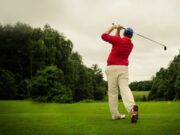by Miguel Humara, Ph.D. and R.L. Willard
Today most sports are available to individuals with disabilities including spinal cord injuries, amputation, cerebral palsy, blindness, and deafness. Sport participation is no longer merely for physical rehab. The reasons for participation in athletic competition by disabled individuals are similar to those of their able-bodied counterparts and include the physical benefits of activity as well as the thrill of competition.
To date, there has not been a lot of research about the psychology of disabled athletes. What we do have, indicates that disabled athletes are very similar, psychologically, to their able-bodied counterparts. More specifically, this has been found to be true in basketball, track & field, swimming, weightlifting, and tennis. Also, wheelchair marathon athletes have been found to have at least the same level of commitment to their sport as highly motivated able-bodied exercisers, which makes a lot of sense.
But what about the added obstacles facing the disabled athlete? Is there something extra, some inner conviction, that makes the “other-abled” determined to excel despite what others might consider a pretty weighty handicap? At the Paralympics, we see and hear of swimmers with no arms, sprinters with one leg – sometimes no legs at all – and hoop players who can hit 8 of 10 from the 3-point line. What is this deep-seated something that lifts amputees from the despair of a hospital bed to the heights of athletic achievement?
Special Needs?
Although one of the goals of competitive sports is to minimize the differences from sport with able-bodied persons and to maintain the same structure whenever it is possible, disabled athletes clearly have specialized needs that are specific to their endeavors. These needs are not just limited to the physical aspects of sport participation. Athletes with disabilities have different psychological needs as well.
The First Hurdle
At the highest performance levels, athletes of every respective type have minimal differences in physical skills; “abled” sprinters regularly place within one-tenth of a second of one another, as do disabled sprinters. Therefore, the mental components are necessarily viewed as crucial in determining success and failure.
Researchers have found that athletic performance has three parts: physical preparation, technical skill, and psychological readiness. This model suggests that if any of the above areas are neglected, athletic performance will decline. Therefore, it is likely that there will be a need to implement psychological performance enhancement strategies that are tailored to the disabled athlete.
However, the first hurdle many disabled athletes face is likely to be mental. Without reaching too far, we can imagine a recent amputee feeling physically “incomplete”. In this case, sports training can help to build much needed confidence, starting with “small steps” and gradually progressing to the point where the athlete can compare her success to others in a similar position, such as Paralympic athletes. And how about the person born with a disability? Like anyone else, the answer lies in the support the budding competitor receives at home, at school and on the field of competition. Even denial – someone saying they can’t do it – can be a great motivational tool, as it sometimes is with mainstream athletes.
Performance Strategies
Just like their “abled” counterparts, disabled athletes can make use of performance enhancing sport psychology tools including anxiety control, focusing strategies, thought stopping, confidence building, and goal setting. However, these tools and strategies may need to be adapted a little bit. For example, a blind athlete may not benefit from traditional imagery techniques and may need to rely more on kinetics – the physical sensation of movement. Similarly, paralyzed athletes probably will not benefit from progressive muscle relaxation as an anxiety reduction technique and may need to rely more on diaphragmatic breathing.
In general, a sports psychologist working with disabled athletes should evaluate alternative considerations, including:
- Physical and psychological trauma that the athletes may have experienced
- Motivations for competition, (i.e., is it for the challenge, fitness, or denial of the disability?)
- Performance problems (like anxiety) due to a limitation caused by the disability
- Physical considerations that can influence future injury and performance
- Socialization issues which may include both physical and social barriers
- Varied organizational structures of sports for persons with disabilities
Conclusion
Reading between the lines, we find that mentally, there are few differences in how able or disabled athletes get their motivation for training and competition. However, in these few differences are very strong nuances that need to be addressed specifically to that athlete and his or her level of physical disability – and how they have been affected as people as a result. With these considerations in mind, we can expect to see an increase not only in sports participation by the disabled, but also in the level of competition . . . providing spectator enjoyment and deep personal satisfaction for many years to come.













